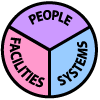|

|
Enterprise Integration Standards
|
|

|
These Enterprise Integration and Cybersecurity Standards are organized according to the Professional Roles that use them.
Click the link below to view the set of standards for that Professional Role.
- Control System Engineers design Automation and Control Systems (ACS).
Control Systems Engineers require several years of education and practical experience before they are authorized to “design and sign” Control and Information Systems for industrial or other hazardous facilities. Control Systems is a "Functional Engineering" definition that encompasses a range of industry-specific sub-disciplines, including Instrument Designers, Industrial Network Designers, Analyzer Specialists, PLC programmers, and others (see PERA Control Engineers' Guide for each industry). These sub-disciplines may vary widely across different industries because of the different risks, equipment types and scale in each industry. Because of this, the qualifications required for a sub-discipline are determined by the appropriate industry and government regulatory bodies.
- IT Specialists design Information Technology (IT) Systems
While these IT systems may be found at any level in an Enterprise Architecture, they do not include control of dangerous industrial equipment or processes (see ACS above). Information Technology also includes many sub-disciplines, such as system analysts, database designers and programmers, commercial network designers, and application specialists. Qualifications for IT Specialists are less strongly regulated since they do not control hazardous equipment or processes. It is aslo generally true that IT Functional Roles are more consistent across industries as they address common applications such as Accounting, H/R, Asset Management and other "higher-level systems that vary less between industries than ACS. Another key distinction between IT and ACS is in the standards and priorities for cybersecurity.
- Operational Technology ( OT ) requires expertise by both ACS + IT.
A good example of this is use of ISA 95 standard to design and operate movement of data from the ACS environment to OT at higher levels in the Enterprise Architecture. In this case, Control Systems Engineers must work with IT specialists to securely and reliably move information from the ACS environment through the IT infrastructure and up to corporate systems. (see MLM-xxx ISA(%....In other cases, OT systems may use IT infrastructure to influence plant control. If risk to personnel, major equipment, and the public is assessed as significant, design must be led by a qualified ACS engineer with assistance as requested from IT. Otherwise, an ACS Engineer or an IT specialist may lead the project according to Project Management. Similarly, during Operations Phase, support and maintenance of the system may require ACS
- Professional Roles that support both ACS and IT.
These include Procurement, Project Management, Human Resources and other Professional Roles whose work processes and training are modified to support the requirements of ACS and IT Professional Roles.
This list is not meant to be exhaustive, but rather to describe the most important Enterprise Integration standards for most industries, and to direct the reader to additional information. Note that it addresses Enterprise Integration, System Architecture, cybersecurity, safety, reliability and system and network interfaces. It does not address product or application standards.
For more a more complete list of relevant Enterprise Integration standards, see The PERA Master Planning Guides for your industry (e.g., chemical industry) and Principal Role (e.g., Owner/Operator or Vendor). Standards in these Master Planning Guides are also organized according to the Discipline (Professional Role) responsible for implementing that standard.
An additional list of standards is provided under the Risk Management Topic (Menu at left). This list is organized by the PERA Enterprise Components of People, Facilities, Systems, and Supply Chains. Since these are carried through each PERA Phase, it becomes easy to coordinate Risks at each phase of the Enterprise Life Cycle (including Master Planning, EPC, Operations, etc.)
General Standards References
Computers and Comunication
Standards and Cross References page is a good standards resource for ACS and IT professionals. It includes links to many relevant standards homepages.
Tech Street Industry
Standards Page This site provides a listing of many engineering standards including prices. They provide a video about how to use their online standards.
They will even send a notice that standards you purchased have changed. Tech Street is not
limited to enterprise integration standards and addresses a huge set of standards
bodies from around the world.
We welcome your Comments and Suggestions
Back to PERA Home Page


